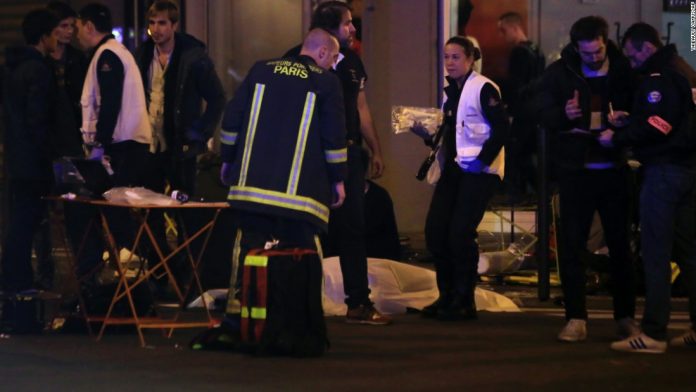
PARIS – Six months after the November terror attacks here, survivors and family members of the 130 people killed in coordinated attacks across the city met Tuesday with the justices in charge of the ongoing investigation, seeking closure to the deadliest incident on French soil since 1945.
During a three-day hearing that began on Tuesday, more than 1,000 people touched by the attacks demanded specifics on how their loved ones died and how such a tragedy could have happened in a city like Paris. Most of those who died were shot as they watched a concert, others while they drank and chatted with friends at cafes.
The November bloodshed was ultimately claimed by the Islamic State, whose operatives largely planned their attacks from nearby Brussels. The same cell of terrorists then carried out the March 22 attacks on the Belgian capital’s international airport and metro system as authorities began to close in on their network.
“The victims need direct contact with the judges,” said Juliette Méadel, the secretary of state responsible for victim support, in an interview.
“They can pose many questions about the investigation and about what happened. The judges are the only ones who can speak precisely and who can verify details.”
For survivors and families, many details remain unclear.
As Georges Salines, who lost his daughter Lola, 29, at the Bataclan theater, asked the French newspaper Le Monde: “How is work being organized with Belgian investigators? Will Mohamed Abrini be interviewed in Belgium or in France? How many people can be held accountable and prosecuted? Can we see that the Franco-Belgian cell was dismantled and taken out of harm’s way?”
In France, hearings between judges and victims are customary after significant crises: There were similar meetings after the crash of the Air France flight between Rio de Janeiro and Paris in 2009 and after the attack on the editorial offices of Charlie Hebdo in January 2015.
What makes this particular hearing different, according to Méadel, is the staggering numbers: There are over 1,000 people represented as civil parties in this case, a number so large that Tuesday’s hearing was held at an amphitheater at Paris’s École Militaire, a stone’s throw from the Eiffel Tower.
Méadel also said that she had hired a team of mental health professionals to be stationed on-site throughout the three days of hearings.
“The simple fact of re-living the crime – the terror, the death, the atmosphere of November 13. The memory can cause an enormous anguish in victims,” she said. “It risks a traumatic outburst.”
Tuesday’s hearing begins just days after the arrival in Paris of Salah Abdeslam, 26, the last surviving suspect of the group that carried out the November attacks.
Abdeslam was arrested in Brussels March 18, which authorities believe may have prompted the Brussels attacks four days later. He was extradited to France last month and was first questioned by French judges May 20.
Despite his long-awaited appearance in French court, Abdeslam exercised his right to silence. However, his French lawyer, Frank Berton, told reporters that his client objected to the 24-hour video surveillance in his cell at Fleury-Mérogis prison outside Paris, Europe’s largest jail.
“That doesn’t help,” Méadel said. “It’s very disappointing for the victims that Salah Abdeslam does not describe anything.”
(c) 2016, The Washington Post · James McAuley

